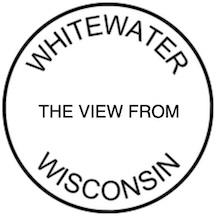Good morning.

Thursday in Whitewater will be sunny with a high of 85. Sunrise is 6:32, and sunset is 7:08, for 12h 35m 19s of daytime. The moon is a waxing gibbous with 64 percent of its visible disk illuminated.
This day in 490 BC is the conventionally accepted date for the Battle of Marathon at which the Athenians and their Plataean allies defeat the first Persian invasion force of Greece.
One of two election law cases before the Wisconsin Supreme Court on Tuesday reveals the extremism of election conspiracy theorists. Of that case (Wisconsin Voter Alliance v. Secord) and one other, Henry Redman reports in Wisconsin Supreme Court hears arguments in two election cases:
The first case involves a right-wing election conspiracy group, Wisconsin Voter Alliance, which has spent years casting doubt on the results of the 2020 election by alleging fraud in the state’s election system. The group, founded by conspiracy theorist Ron Heuer, has been filing records requests with counties across the state seeking documents showing the identities of people in Wisconsin who have been declared incompetent by a judge and had their right to vote taken away.
….
The Wisconsin Voter Alliance has asked for the names and addresses of people who have been declared incompetent in guardianship cases so the group can compare that list with the voter rolls in the statewide voter registration database and find any people who have been voting despite having the right to do so taken away. County officials across the state have been denying these requests because state law requires that any court records in these cases “pertinent” to the declaration of incompetency be kept secret.
Open access to public records is a right, and a significant one, but not unlimited. Here, a private party wants to conduct its own examination, but as Redman reports the argument from Walworth County’s counsel, there is already a lawful public process to investigate people declared incompetent from voting:
Samuel Hall, the attorney representing Walworth County, argued the law requires that these records be kept confidential.
“Now the purpose behind the request and who the requesters are, as noble as they may be, are irrelevant under Wisconsin public records law,” Hall said. “The truth of the matter is that the District 2 Court of Appeals decision blasts open the door for the personal information of some of the most vulnerable people in our communities to be broadcast, not only to those with noble and good intentions, but to those who might do these folks harm or seek to defraud them.”
He added that to the extent that there is an interest in conducting oversight of this government function — in which the court system is required to make local election clerks aware of decisions so the clerks can update voting records — there are plenty of avenues to do so without a private citizen or organization getting access to information state law deems confidential.
“To the extent that there’s a desire to have oversight or a watchdog, per se, it doesn’t need to be done by a private individual or a private organization. Voting when ineligible to do so is a class I felony,” Hall said. “If there is a concern that that is going on, reporting it to law enforcement, reporting it to a local sheriff, could lead to a criminal investigation. We have a legislative process where even, you know, the Assembly or Senate could conduct inquiries, or the Wisconsin Elections Commission itself could conduct inquiries. None of that has happened here. This is a private organization seeking personal information of court documents that the Legislature has already deemed closed.”
That’s spot on: a private party’s right to review incompetency records has already been decided by the Legislature. (That this private party would very much like to see these records doesn’t matter; it’s law not private feeling that should govern here.)
SpaceX Polaris Dawn crew steps out of capsule for first private spacewalk:
